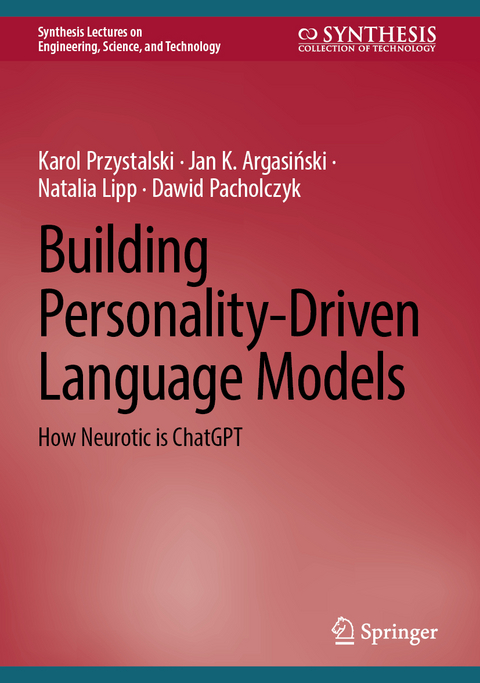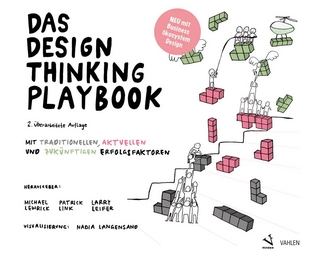
Building Personality-Driven Language Models
Springer International Publishing (Verlag)
978-3-031-80086-3 (ISBN)
- Noch nicht erschienen - erscheint am 19.04.2025
- Versandkostenfrei
- Auch auf Rechnung
- Artikel merken
This book provides an innovative exploration into the realm of artificial intelligence (AI) by developing personalities for large language models (LLMs) using psychological principles. Aimed at making AI interactions feel more human-like, the book guides you through the process of applying psychological assessments to AIs, enabling them to exhibit traits such as extraversion, openness, and emotional stability. Perfect for developers, researchers, and entrepreneurs, this work merges psychology, philosophy, business, and cutting-edge computing to enhance how AIs understand and engage with humans across various industries like gaming and healthcare. The book not only unpacks the theoretical aspects of these advancements but also equips you with practical coding exercises and Python code examples, helping you create AI systems that are both innovative and relatable. Whether you're looking to deepen your understanding of AI personalities or integrate them into commercial applications, this book offers the tools and insights needed to pioneer this exciting frontier.
Dr. Karol Przystalski obtained a PhD degree in Computer Science in 2017 at the Jagiellonian University in Cracow, Poland. He used to be the CTO and founder of Codete, an Exadel company. He is working with Fortune 500 companies on data science projects. He has been a lecturer at the Jagiellonian University in Cracow since 2010. His areas of research interest are medical imaging analysis, artificial intelligence, large language models, machine learning security, pattern recognition, and image processing.
Dr. Jan K. Argasinski got his PhD in Studies on Art (New Media/Software Studies) in 2015. Also holds master's degrees in New Media Studies, Philosophy, and completed his studies in Neurobiology at the Jagiellonian University in Krakow. He is an Assistant Professor at the JU's Institute of Applied Computer Science and Senior Researcher at the Sano - Centre for Personalized Computational Medicine. Authored over 30 various scientific publications (incl. co-authoring of 3 books) and gave over 100 scientific and popular science presentations. His areas of expertise are artificial intelligence, affective computing, computational neuroscience and VR/AR. Member of Polish Artificial Intelligence Society (PSSI) since 2019.
Dr. Natalia Lipp is a psychologist with a Ph.D. degree in Social Sciences obtained in 2022 at Jagiellonian University. She is an assistant fellow at the Institute of Applied Psychology at JU and a postdoctoral researcher at Sano - Centre for Personalized Computational Medicine. Her research concerns the psychological factors of human-computer interaction, particularly the role of immersion and imagination in task performance in virtual reality. She is devoted to enhancing user's well-being and increasing trust in AI.
Dawid Pacholczyk, currently advancing in a PhD program, concentrates on implementing simulations and Large Language Models for grooming emerging managers. He holds a master's degree in Software Architecture and has asserted his expertise as an Assistant Professor at the Polish-Japanese Academy of IT. Also is the esteemed author of a pivotal book on product management and has disseminated multiple industry articles, elucidating the applications of Augmented Reality in e-commerce. He had manifested his scholarly insights in various publications within the augmented reality domain. His research primarily navigates through Generative AI, management simulation, future managers training techniques, usage of AI at schools, practical aspects of AR.
Introduction.- Interacting Subjects in the Age of Artificial Intelligence.- The Rise of the Large Language Models.- What are LLMs anyway? (Not overly) technical introduction to LLMs.- Modeling (everything) in LLMs.- Psychology hidden in the (Language) Model.- Traits Models of Personality in LLMs.- Simulating Personalities.- Simulating Personalities in Healthcare.- Simulating Personalities in Business.- Simulating Personalities in Training & Education.- Simulating Personalities in Games.- Simulating Personalities in Art.- Simulating Personalities in Scientific Research.- Conclusion.
| Erscheint lt. Verlag | 19.4.2025 |
|---|---|
| Reihe/Serie | Synthesis Lectures on Engineering, Science, and Technology |
| Zusatzinfo | XV, 190 p. 20 illus., 10 illus. in color. |
| Verlagsort | Cham |
| Sprache | englisch |
| Maße | 168 x 240 mm |
| Themenwelt | Informatik ► Software Entwicklung ► User Interfaces (HCI) |
| Informatik ► Theorie / Studium ► Künstliche Intelligenz / Robotik | |
| Technik ► Nachrichtentechnik | |
| Schlagworte | applied computer science and psychology • Artificial Intelligence • Large Language Models • Personality-Driven Language Models • Psychology and artificial intelligence |
| ISBN-10 | 3-031-80086-9 / 3031800869 |
| ISBN-13 | 978-3-031-80086-3 / 9783031800863 |
| Zustand | Neuware |
| Informationen gemäß Produktsicherheitsverordnung (GPSR) | |
| Haben Sie eine Frage zum Produkt? |
aus dem Bereich


